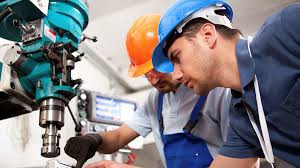 There is a global growing demand for quality and functional products, especially in emerging markets with a rising middle class, and companies are eager to improve product features and to optimize production efficiency so as to reduce costs along the life-cycle of products and to accelerate time-to-market. All of these fuel the demand for advanced manufacturing technologies. Suppliers of advanced manufacturing technologies, such as the machine tool industry, are able to respond to this demand; new technologies (e.g. internet of things, big data, micro/nano-electronics, and photonics) especially empower them to produce increasingly smart and efficient production solutions.
There is a global growing demand for quality and functional products, especially in emerging markets with a rising middle class, and companies are eager to improve product features and to optimize production efficiency so as to reduce costs along the life-cycle of products and to accelerate time-to-market. All of these fuel the demand for advanced manufacturing technologies. Suppliers of advanced manufacturing technologies, such as the machine tool industry, are able to respond to this demand; new technologies (e.g. internet of things, big data, micro/nano-electronics, and photonics) especially empower them to produce increasingly smart and efficient production solutions.
The world market for machine tools only is forecast to grow from the current level of €60 billion to €80 billion over the next five years. Today, CECIMO countries generate 39% of the global machine tool output. 60% of machine tools will be consumed in Asia, which represents bright export opportunities for European machine tool builders. Smart manufacturing, which refers to a broader definition modern production technologies, could create $371 billion in net global value over the next four years, according to a 2014 estimate from the market intelligence firm IDC.
Historically, the share of manufacturing jobs has been declining in the developed economies whilst productivity and manufacturing output have grown (except the times of economic recession) over the past decades. The number of jobs in manufacturing industry is not expected to grow in advanced economies due to ongoing improvements in productivity and innovation. Nevertheless, due to demographic evolutions and an exacerbating shortage in the skills pipeline, there will be “employment opportunities” in advanced manufacturing industries a term which refers to both suppliers and users of advanced production equipment and solutions. The shift to “smart manufacturing”, in particular, is expected to generate “support jobs” such as design, modeling and simulation experts who use high-performance computing to optimize factories of the future [Source].
Due to recent rapid changes in technology, market structure and business models, the skill requirements in advanced manufacturing technology industries are soaring. An important share of the experienced workforce in the European manufacturing industry is expected to retire within the next decade. The machinery industry, for instance, is one of the sectors with the oldest age profiles [Source]. It is a tremendous challenge, in particular, for SMEs to address the skills shortage because of their limited resources and the rising costs of training which is linked to the increasing technological complexity in manufacturing. SMEs are the backbone of the European machine tool industry, representing more than 80% of the companies, and they are the driver of innovative and cutting-edge applications thanks to their agility, flexibility and entrepreneurial spirit.
Europe’s advanced manufacturing industry is poised to grow in local and global markets, but a widening skills gap may hold back its future growth potential. An effective training and skills strategy will be key to feed into the competitiveness of the sector whilst ensuring the employability of the workforce. Public policy has an essential role to play to this end.
Firstly, a high priority should be placed on securing a sufficient number of talented people in the skills pipeline. Collaboration between schools, parents, local authorities and manufacturers is should be enhanced to provide information on jobs prospects in manufacturing and to offer career guidance to students, which could translate in an increased number of STEM graduates. Secondly, policy-makers should place a strong emphasis on ensuring quality vocational programmes which can deliver the technical skills required in the workplace. These skills are growing in complexity as production workers need to deal with production equipment with high technology and IT content. Furthermore, transversal skills (e.g. information processing, analytical thinking, ICT skills, communication and collaborative skills), which are not included in education curricula yet, are becoming an essential element to boost efficiency, productivity an innovation at the workplace.
As low-value and repetitive manufacturing tasks become automated and computerized, the value creation is increasingly taking place at the level of product development and product design. Coupled with technology integration in manufacturing equipment, this boosts the skills needs at degree level. Therefore, there is an urgent need to align graduate curriculum with the technological landscape which is changing at a much faster pace. Engineering degrees should integrate research with technology and manufacturing, and they should provide engineers with practical skills that would enable them to transform ideas into products. University-industry-government cooperation is essential to bring such initiatives to life.
Last but not least, life-long learning programmes both within companies and with education providers should be supported to ensure the constant up-skilling of the workforce in our changing world. Since machine tool builders operate in an increasingly globalised market place, they need to respond to the customized needs of customers across world regions. It is, therefore, becoming a pre-requisite to raise communication, inter-cultural, foreign languages, negotiation, leadership and strategic management skills amongst the professional staff and top management



